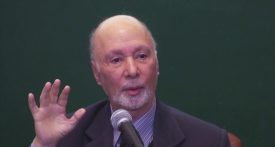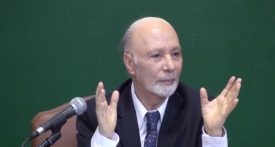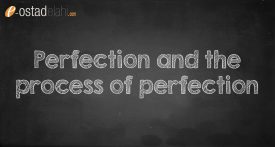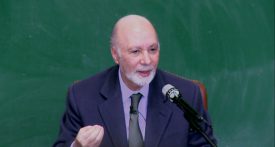Search results for tag "Perfection" - 10 answer(s)
104
Vote
As we have seen, the imperious self functions on the basis of the “terrestrial” values (ego and material interests). Its action on us could be summarized as follows: to focus our thoughts and aspirations solely toward terrestrial values and to make us forget celestial values; to put it in another way: to make us act solely according to our own material and selfish interests with no regard for others’ interests or for our spiritual dimension.
Read more
115
Vote
If the plural “portraits” is used here, it is to best illustrate the multifaceted and elusive figure of our inner life for the imperious self is a shape-shifting model that makes for a difficult subject for a painter. We never really know where to find it when we look for it, and we often find it where we have not been looking for it—at times in our outward behaviour, more often in our thoughts and emotions, in our most daily activities as well as in our actions that appear most spiritual and most noble. The imperious self is like a creeping rootstalk that runs underground and spreads itself out in the Self.
Read more
144
Vote
This is the first piece in an extended series dedicated to the practice of ethics and more specifically to the identification of the main source of our anti-ethical tendencies: the imperious self. This concept is given a precise definition in The Path of Perfection: “The imperious self is a powerful psychological energy that is harmful for the soul. This energy is continuously produced by the activity of our character weak points, resulting in anti-ethical and anti-divine impulses and desires at the level of our conscious self”.
The paradox is that the fierce resistance deployed by our imperious self against our ethical endeavours actually constitutes the necessary condition for the process of spiritual perfection to take place. In this sense it could very well be considered as our “best enemy”.
Read more
348
Vote
Human beings aren’t what they are from the outset. Endowed with reason and free will, it is our duty to bring about humanity within ourselves by actively engaging in our process of spiritual perfection. But in order to direct our efforts toward real spiritual perfection, we need a road map to show us which way to go and how to actually get there. In this regard, Ostad Elahi talks about a right to divine guidance, which is the logical consequence of our duty to perfect ourselves.
Read more
278
Vote
 It is always possible to limit one’s knowledge of the principles that constitute any given philosophy, spiritual thought, religion or psychological theory to a purely theoretical level. This approach sometimes suffices to help give a general direction to one’s life and provide a reassuring framework by lending meaning to one’s experiences. To set into motion a genuine process of change in oneself it is however necessary to enter the practical realm of spirituality, namely, the process of perfection of the soul. But where to begin? What exactly should one do? The point here is not to put into practice religious rituals or to apply predefined moral prescriptions. In fact, spiritual work begins with a self-discovery. The first step is to observe oneself, as if from the outside, to carefully analyse oneself, and to “accurately assess [one’s] own attributes, positive qualities, strong points, flaws, weak points, etc.”. This approach requires a good amount of sincerity as it involves acknowledging and confronting one’s faults. It also requires a minimum of self-confidence in order not to lose hope in the face of one’s weaknesses. Finally, it is essential to keep in mind that this inventory of our personality must be done in the context of the process of spiritual perfection. In other words, the criteria with which we would measure our strengths and weaknesses and our qualities and faults should not be dictated by social trends but by ethical and spiritual values. For example, an introverted or reserved personality can appear, socially speaking, as a weak point, whereas it is neither a fault nor a quality spiritually speaking. It can even be an asset, as introverted people often have a greater capacity for self-analysis.
Read more
1354
Vote
As far as spirituality goes, a purely theoretical approach to principles, detached from actual practice, will not do. Not only is it inefficient, it constitutes a genuine impediment to spiritual progress: that of smugness or spiritual “superioritism”. Professor Bahram Elahi spells this out in the following excerpt from a lecture given at the Sorbonne (Paris) […]
Read more
566
Vote
If ethics is about principles, practicing ethics is about method. In this field, we can assume that not just any method will do. So we have to figure out which method will be the most efficient to get us closer to our goal of progressing towards spiritual perfection.
For the purposes of this post, I will assume that the reader is familiar with the various psychological forces at play in the paradigm of the process of perfection, and in particular with the concept of imperious self (IS), which may be defined as an impulsive force systematically opposed to spiritual progress. The IS is protean—it creeps in through the cracks created by our moral faults or lack of attention. It takes on different looks depending on the person and the circumstances. One day it will oppose itself to your spiritual work head-on, and the next, like a chameleon, it will pass itself as a spiritual thought and deceive your reason.
Read more
1565
Vote
Ostad Elahi used to define his teachings as a new medicine of the soul: one that is adapted to the true nature of human beings and adheres to the law of causality governing both their spiritual and material lives. The spirituality he practiced was natural spirituality, and he considered the process of spiritual perfection to resemble an academic curriculum.
The excerpts presented here are drawn from a lecture given at the Sorbonne in March 2011, in which Professor Bahram Elahi revisits various aspects of Ostad Elahi’s philosophy. Rephrasing them in a simple and direct manner, he relates these points to fundamental questions and examines them from a rational standpoint.
Read more
721
Vote
Every being is created for the purpose of reaching a state of complete fulfilment, i.e., perfection. In order to achieve this goal, all beings must undertake the process of perfection, which provides their lives with ethical and spiritual meaning.
Perfection concerns all beings, without exception. Ostad Elahi divides beings into several categories: minerals (in general, all things said to be inanimate), plants, animals, and human-animals. Every being that exists is a creature inasmuch as it results from a series of causes, the first of which is the Creator. The purpose of creation, according to Ostad Elahi, is the return to the origin. “Everything that exists emanates from Him, and everything returns to Him at the end of its process of physical and spiritual maturation called the process of perfection.” Once it has reached its perfection, a being can fully benefit from the potential for happiness for which it was created.
Read more
1988
Vote
Professor Elahi regularly lectures in Europe and North America. In October 2010, his talk in Paris focused on two key concepts in Ostad Elahi’s thought: self-knowledge and Perfection. Self-knowledge refers to active, concrete, in vivo knowledge of the powers that constitute our being, a knowledge that becomes more refined through the practice of true ethics, based on correct divine principles. According to Professor Elahi, everything else results from this, including the level of development reached by the “metabrain”, as well as the understanding and freedom that one can enjoy here and in the other world.
Read more
Next »
|

 News
News Podcast
Podcast













Recent Comments